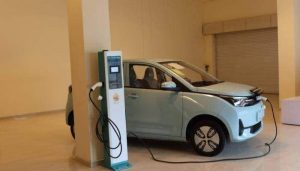
As the Grand Ethiopian Renaissance Dam (GERD) or widely referred to as Abbay Dam is nearing its completion it comes with multiples of opportunities that can assist the country to beef up its efforts of cleaning its economic development from environment polluting sources of energy.
As a country of about 120 million people Ethiopia has to develop its manufacturing, agro processing, tourism sectors and urbanization to adequately cater for the rapidly growing needs of the people. All these sectors need a reliable, modern, affordable and clean sources of energy. The best sources of energy in this regard is hydroelectric power.
Ethiopia currently obtains vast majority of its electricity from hydropower dams. It is further expanding its generation capacity to meet the ever growing demand at home as well as to supply energy to neighboring countries.
In this regard the most burning issue in harnessing the energy sector to ensure a clean and safe environment for the future is introducing and speeding up the usage of electric vehicles. Motor vehicles are the major reasons for the pollution of the environment as they emit a large amount of carbon dioxide to the environment. Therefore, it is mandatory to encourage the utilization of electrical vehicles for public and private applications.
Electric vehicle (EV) transportation refers to modalities that do not use fossil fuels. These transportation systems are critical for climate change mitigation since they emit no greenhouse gases. Unlike other forms of transportation, such as motorized cars, which contribute to climate change via the use of fossil fuels, it emits no carbon dioxide.
So, by encouraging the use of electric vehicles, the country may cut carbon emissions and contribute to the fight against climate change. Furthermore, electric vehicle transportation is more energy efficient than motorized transportation since it uses renewable resources, whereas motorized vehicles rely on finite fossil fuels. Countries that transition to electric vehicle mobility can lower their overall energy usage and reliance on fossil fuels. More significantly, electric cars enhance air quality. It generates contaminants that exacerbate poor air quality and respiratory issues.

As a result, governments are recommended to employ electric vehicles (EVs), which run on electricity rather than gasoline or diesel fuel. They run using electric motors and rechargeable batteries, which eliminates the need for traditional fossil fuels. EVs are considered a more ecologically friendly alternative to typical internal combustion engine vehicles since they emit no tailpipe emissions and may be fueled by renewable energy sources. They’re growing more popular as technology evolves and charging infrastructure improves.
More and more people are realizing that electric cars are essential to sustainable transportation systems everywhere, even in Ethiopia. It is advantageous for the environment. The potential of electric cars to lower air pollution and greenhouse gas emissions is one of the main arguments in favor of their promotion in Ethiopia. Ethiopia can drastically reduce its carbon emissions and enhance air quality by switching to electric vehicles (EVs) from conventional fossil fuel-powered cars, particularly in metropolitan areas where vehicle emissions contribute to pollution.
In addition, Ethiopia has made investments in clean energy technologies including solar, wind, and hydropower. By encouraging the use of sustainable energy sources to charge electric cars, the country lessens its need for imported fossil fuels and improves its energy security. It also offers financial potential. Ethiopia may benefit economically from the promotion of electric cars in several areas, including manufacturing, infrastructure development, and employment generation. Reducing reliance on imported cars and fuel while promoting economic growth and innovation may be achieved by developing a local EV sector and supply chain.
It is also vital for the country’s health care system. The move to electric cars can benefit public health by lowering air pollution and related health hazards. Cleaner air from the use of EVs may result in fewer respiratory ailments and other health concerns associated with automobile emissions. More importantly, electric cars contribute significantly to climate change mitigation by lowering carbon emissions from transportation. As Ethiopia seeks to achieve its climate objectives and pledges, encouraging electric vehicles may help the country lower its carbon footprint and transition to a low-carbon economy.
Despite the benefits, electric cars require a well-developed infrastructure. To promote electric cars in Ethiopia, investments in charging infrastructure, grid upgrades, and supporting legislation are needed. Building a comprehensive EV charging network across the country can inspire more people to switch to electric vehicles.
Considering this challenge, the government is working hard to offer charging stations around the country. It also offers incentives for people who import electric automobiles. According to Ethiopia’s Transport and Logistics Minister, 60 electric car charging stations have been built around the city of Addis Ababa.
Ethiopian Ministry of Transport and Logistics State Minister Bareo Hassen stated that the number of electric cars imported and serviced in the country has exceeded 100,000. As a result, 60 electric car charging stations have been constructed and are already operational throughout Addis Ababa.
Besides, just like at gas stations, efforts are being made to create an option for electric vehicle owners to charge their vehicles in addition to their homes. Therefore, in Addis Ababa alone, it is planned to install one thousand 176 charging stations within 10 years, he added.
The ministry is focused on expanding the number of electric car charging stations in regional cities. It also introduces long-distance automobiles onto the market. To extend electric power charging stations in other cities around the country, efforts are being made to collaborate with necessary institutions, organizations, and the business sector to find a location for the centers to operate. Because the country will construct 2,335 electric car charging stations across the country in the 10-year developmental plan, he elucidated.
BY EPHREM ANDARGACHEW
THE ETHIOPIAN HERALD TUESDAY 2 APRIL 2024




